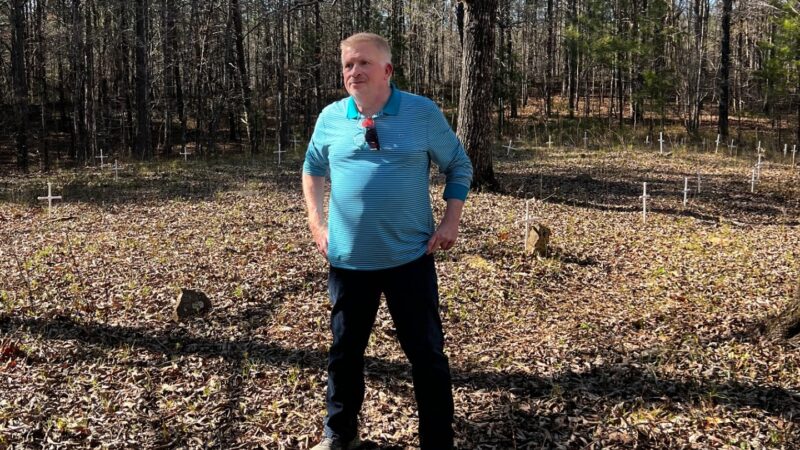Author revives forgotten stories through historical fiction novel based in Birmingham
Tannehill Ironworks Historical State Park southwest of Birmingham is still covered with leaves shed from last fall, and new, green underbrush is just beginning to peek up from underneath it. University of Alabama English Professor Barry Cole and his husband walk through the park.
“It’s quite a nice local touristy place,” Cole said. “But beyond that, it’s a place of history.”
The Tuscaloosa author is using historical fiction to revive the lost history of enslaved people found buried in a mass grave at the park. That book, called 100 Pearls, is out Thursday.
The park is littered with historical markers and benefits from years of restoration efforts to the former furnaces where Confederate bullets and cannonballs were once forged. But in the early 2000s, an archeologist named Jack Bergstresser, the then director of the park’s Iron and Steel Museum, dug a little deeper. His research uncovered the remnants of the enslaved people’s homes at the ironworks.
“So those are like foundations that they used,” Cole said, gesturing to faint stone outlines nearly hidden in the underbrush. “The wooden frames have long since rotted away.”
But research also uncovered something more: a mass grave deep in the forest.
Introducing Sadie
Sadie is the main character of Cole’s book.
“Sadie has a sense of humor,” Cole said with a laugh. “She has a bit of a sense of humor, and she’s strong.”
When Cole first learned about the mass grave of enslaved people at Tannehill, and the lack of literature and information about the people who were enslaved there, he was inspired to write. While no one knows the names of the people buried there, he decided to create a fictional character whose story sheds light on the lives the real people may have lived.
“The arc of her story intersects several avenues of enslavement,” Cole said. “At rice plantations, cotton plantations, and, of course, iron working plantations.”
But Sadie’s story begins in 1700s Gambia. Her Gambian name means princess, indicating both her status in the tribe and, Cole stressed, her human value. She and her mother are taken by slave traders and sold into slavery in Savannah.
“As Sadie’s story unfolded for me, I realized the power that was necessary to survive this kind of brutality,” Cole said.
Throughout the book, Sadie is enslaved on plantations across the South. She is brutalized by her owners, who beat her, rape her and nearly kill her. It took Cole 17 years to write the book, in large part because many scenes are dark and proved difficult to write. But every time he put the story down, he said he was haunted by Sadie and the untold stories of Tannehill. Cole said Sadie’s strength helped him push through.
“She found her purpose in life was to help liberate her people using Christianity,” Cole said.
As she ages, Sadie becomes a preacher and works to give her fellow slaves hope. Over and over she tells them, “we are all God’s children,” emphasizing their humanity. Sadie’s faith and the hypocrisy of the Christian slave owners come to a head. But even when she finally is enslaved at the Tannehill Ironworks, Cole said she turns the tables on her slave holders.
“Her personal power reached its crescendo here as well,” Cole said, referring to Tannehill. “The older she grew, the more powerful she grew, the wiser she grew.”
Stories that must be told
Cole’s story is based on his own historical research. He does not shy away from writing about the most dangerous work done by hundreds of enslaved people who lived and died at the iron works.
“We cannot stop telling stories because they are hard to listen to,” Cole said. “We will never have a path forward until we realize where we have come from.”
After walking for about an hour across the rocky pathways through the Tannehill woods Cole and his husband reach a chain link fence. Inside is a small clearing as rocks from the old quarry dot the fresh flowers and grasses in neat rows across the little yard. These, Cole said, were left after the geologists discovered the mass grave, placed over where research indicates bodies may be, although their names are not known.
“It may sound silly, but I made a promise to the people in this mass grave that I would do everything I could to represent them in a worthy story,” Cole said.
Having finished his book 100 Pearls, Barry Cole says, his promise is finally fulfilled.
Auburn tabs USF’s Alex Golesh as its next coach, replacing Hugh Freeze on the Plains
The 41-year-old Golesh, who was born in Russia and moved to the United State at age 7, is signing a six-year contract that averages more than $7 million annually to replace Hugh Freeze. Freeze was fired in early November after failing to fix Auburn’s offensive issues in three seasons on the Plains.
Alabama Power seeks to delay rate hike for new gas plant amid outcry
The state’s largest utility has proposed delaying the rate increase from its purchase of a $622 million natural gas plant until 2028.
Former U.S. Sen. Doug Jones announces run for Alabama governor
Jones announced his campaign Monday afternoon, hours after filing campaign paperwork with the Secretary of State's Office. His gubernatorial bid could set up a rematch with U.S. Sen. Tommy Tuberville, the Republican who defeated Jones in 2020 and is now running for governor.
Scorching Saturdays: The rising heat threat inside football stadiums
Excessive heat and more frequent medical incidents in Southern college football stadiums could be a warning sign for universities across the country.
The Gulf States Newsroom is hiring an Audio Editor
The Gulf States Newsroom is hiring an Audio Editor to join our award-winning team covering important regional stories across Mississippi, Alabama and Louisiana.
Judge orders new Alabama Senate map after ruling found racial gerrymandering
U.S. District Judge Anna Manasco, appointed by President Donald Trump during his first term, issued the ruling Monday putting a new court-selected map in place for the 2026 and 2030 elections.









